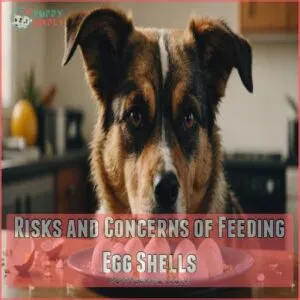This site is supported by our readers. We may earn a commission, at no cost to you, if you purchase through links.
 Can dogs eat egg shells? Absolutely, but with a few precautions.
Can dogs eat egg shells? Absolutely, but with a few precautions.
Egg shells are a natural and affordable source of calcium, which is great for your dog’s bones and teeth.
However, it’s important to prepare them properly to avoid potential hazards like digestive upset or Salmonella.
Always wash the shells, crush them into a fine powder, and bake them at a low temperature to kill any bacteria.
Sprinkle a small amount on their food and see how it goes.
But remember, never go overboard—just like us, dogs need balance.
Curious about other safe treats for your pup considering that ham is not a healthy option for most dogs due to its high sodium content? There’s more to explore!
Table Of Contents
- Key Takeaways
- Benefits of Egg Shells for Dogs
- Nutritional Value of Egg Shells
- Risks and Concerns of Feeding Egg Shells
- Preparing Egg Shells for Dogs
- Benefits and Risks of Feeding Eggs to Dogs
- Side Effects of Eating Egg Shells
- My Dog Ate Egg Shells – What Do I Do?
- How Much Egg Shells Should a Dog Have?
- Safe Alternatives to Egg Shells
- My Dog Ate Eggshells: Next Steps
- Frequently Asked Questions (FAQs)
- Will egg shells harm dogs?
- Can dogs eat eggshells or not?
- How many eggs can a dog eat in a day?
- Are eggs toxic to dogs?
- What happens if dogs eat egg shells?
- Can dogs eat whole raw eggs with shell?
- How do I prepare egg shells for my dog?
- Can I crack a raw egg in my dog’s food?
- Can puppies eat egg shells safely?
- Are organic egg shells better for dogs?
- How often can dogs eat egg shells?
- Do egg shells help with joint health?
- Can I use store-bought egg shell supplements?
- Conclusion
Key Takeaways
- You can feed your dog egg shells as a natural source of calcium, but always wash, bake, and crush them finely to avoid choking and bacteria risks.
- Sprinkling a small amount of crushed egg shell on your dog’s food can help boost bone, dental, and joint health, thanks to its calcium carbonate content and collagen.
- Start by introducing egg shells gradually and consult your vet to find the right balance and prevent over-supplementation.
- Monitor your dog for any digestive upset or allergic reactions and adjust the dosage as needed for their specific needs.
Benefits of Egg Shells for Dogs
Just like cooked cartilage supports joint health and dental benefits, you might be surprised to learn that egg shells can offer significant benefits for your dog’s health.
They’re a natural and affordable way to boost calcium for strong bones and improve dental and joint health.
Calcium Source
Boosting your dog’s bone health with egg shells is like giving them a natural calcium supplement straight from the source.
Consider these benefits:
- Calcium Power: Egg shells are packed with calcium carbonate, great for bone health.
- Adding egg shells to their diet can also help prevent calcium deficiency, a condition that can lead to hypocalcemia, as seen in some puppies with imbalanced.
- They help meet your dog’s dietary needs for calcium.
- Natural Option, A safe and affordable choice compared to commercial supplements.
- Dietary Balance: They help meet your dog’s dietary needs for calcium.
Dental Health
Imagine this: your dog’s teeth shine bright, thanks to egg shell powder.
Incorporating crushed raw egg shells in their diet may aid in teeth cleaning by reducing tartar buildup.
The chewing benefits enhance gum health, reminding us that small changes boost dental health considerably.
It’s a natural, savvy trick for dog health and nutrition.
Joint Health
For your furry friend facing arthritis, egg shells might just be the unsung hero.
Packed with collagen in their inner membrane, they offer natural supplements that can aid joint health.
As part of alternative therapies, these humble shells support mobility, possibly giving your dog some arthritis relief.
Make sure you’ve crushed them finely, whether from raw eggs or cooked eggs, for safe consumption.
Natural and Affordable
While joint health is a significant perk, egg shells also shine as a natural and affordable option.
They’re a cost-effective choice for homemade dog food and DIY dog treats.
Consider these benefits:
- Calcium-rich alternatives
- Budget-friendly choice online stores like egg shell powder products(egg shell powder products)
- Egg shell powder benefits
- Easy to integrate into meals
- Supports senior dogs needs
Egg shells are simply a win-win!
Nutritional Value of Egg Shells
You mightn’t think of egg shells as a nutritional powerhouse, but they actually offer a surprising array of benefits for your dog’s health.
Packed with calcium carbonate, magnesium, phosphorus, and even a bit of collagen, these crunchy bits can support everything from bone health to joint wellness.
Calcium Carbonate
Along with other nutrients, eggshells are a fantastic calcium source for your canine companion.
Calcium carbonate, the main component, is essential for strong bones and teeth.
Think of it as nature’s little bone-building supplement!
However, always introduce egg shell powder gradually and consult your vet, as too much calcium can cause problems.
Remember, a balanced diet is key to your dog’s overall health and happiness.
Proper preparation is essential to avoid digestive upset or choking hazards.
Magnesium and Phosphorus
Calcium carbonate isn’t the only star in egg shells.
You’ll find magnesium and phosphorus, two minerals your dog’s diet loves.
These minerals support bone health and turn regular meals into a powerhouse of nutrients.
Instead of reaching for commercial supplements or dairy products, egg shells might just do the trick.
However, always consult a vet, especially for puppy nutrition or underlying health issues.
Collagen in Inner Membrane
Egg shells aren’t just about magnesium and phosphorus.
The real magic happens in the inner membrane boasting collagen.
This protein powerhouse benefits your dog’s joints, offering arthritis support and enhancing mobility.
Think of it as nature’s little helper wrapped inside a shell.
For more products utilizing the benefits of egg shells for dogs, check out dog egg shell products.
- Joint relief for senior dogs
- Boosted mobility for playful pups
- Affordable pet care solutions
Risks and Concerns of Feeding Egg Shells
Feeding your dog egg shells might sound like a crunchy treat, but there are some risks you should think about.
From potential digestive issues and choking hazards to bacterial contamination and over-supplementation, it’s important to prepare them carefully and consult your vet.
Digestive Issues
While egg shells pack a nutritional punch, feeding them can cause digestive upset in your dog.
Larger pieces might lead to stomach upset, and you risk seeing diarrhea or vomiting concerns.
Consider consulting a dog calcium supplement option to make sure your pet is getting the necessary nutrients.
To minimize discomfort, make sure the shells are finely powdered.
It’s like trying to prevent a doggie dilemma before it starts.
Keep a close eye on your pet’s response.
Choking Hazard
Moving from digestive woes, remember that egg shell size matters for your furry friend.
Larger pieces might seem harmless but could lead to choking, especially in small dog breeds.
Crush those shells into a fine powder using the right method.
This isn’t just about safety – it’s about offering your dog a smart, safe treat.
Let’s keep choking prevention a priority.
Bacterial Contamination
You’ve considered the choking hazards, but have you thought about the Salmonella risk?
Egg shell hygiene is no laughing matter.
Make sure you wash and bake those shells to prevent any sneaky bugs from harming your dog.
Cooking safety is key; keep contamination prevention top of mind.
So, give those egg shells a clean and heat before sharing with your furry friend.
Over-Supplementation
So, you’ve tackled bacterial concerns; now let’s talk about overdoing it.
Too much calcium? That’s where you risk calcium toxicity, leading to hypercalcemia.
This can mess with kidney function, impacting muscle function and even bone health.
Think of it like this: too much of a good thing isn’t always good. Moderation is key!
Always check with your vet before adding egg shells to your pup’s diet.
Preparing Egg Shells for Dogs
To safely prepare egg shells for your dog, start by washing and thoroughly drying them to remove any harmful residues.
Next, crush the shells into a fine powder and bake at a low temperature to guarantee safety.
Then follow proper feeding guidelines.
Washing and Drying
To prepare egg shells for your dog, wash them under hot water and remove any egg residue to make sure effective bacteria removal.
Use a gentle washing technique, as if coaxing out stubborn stains.
Let them air dry thoroughly, as drying time is essential for safe shell preparation.
Pay attention to water temperature—it needs to be hot.
Crushing Into Powder
Think of the humble mortar and pestle as an essential tool for crushing eggshells into a fine powder, just as huskies require finely prepared foods like cooked eggs for huskies. This texture helps prevent safety concerns like choking.
Other methods to achieve powder perfection include:
- Coffee grinder
- Blender
- Rolling pin and ziplock bag
- Food processor
- Wooden spoon and bowl
These tools transform eggshells into a safe, consumable form for dogs.
Baking for Safety
When baking egg shells for your pup, set your oven temperature to 200°F and bake for 10-15 minutes.
This step helps with bacterial reduction.
Once baked, let them cool before using your best crushing technique.
Check out this handy table:
| Step | Detail |
|---|---|
| Oven Temperature | 200°F |
| Baking Time | 10-15 minutes |
| Cooling Time | Until cool |
| Crushing Technique | Mortar & Pestle |
| Safe Handling | Wash hands after |
Now, you’re all set for safe handling!
Feeding Guidelines
After ensuring your egg shells are properly baked, focus on serving size.
A sprinkle of finely crushed shell powder on food can work wonders.
Frequency matters too—you don’t want calcium overload.
Tailor the dosage to your dog’s breed and size, keeping potential risks in check.
When in doubt, chat with your vet for dosage recommendations and breed considerations.
Benefits and Risks of Feeding Eggs to Dogs
You might wonder if feeding eggs to your furry friend is a smart idea since they pack plenty of nutrients like protein, vitamins, and minerals.
However, you should know that raw eggs carry risks of bacterial contamination and can cause allergies, especially if your dog also gets into other high-protein foods like cat food safely, so you should talk to your veterinarian before adding them to your dog’s dog diet.
Nutritional Benefits
Besides being a protein powerhouse, eggs offer a surprising array of benefits for your canine companion. They’re packed with nutrients.
- Bone Health Boosters: Calcium and other minerals strengthen bones.
- Digestive Enzymes: Aid in better digestion.
- Essential Fatty Acids: Promote healthy skin and coat.
- Vitamins & Minerals: Support overall health.
- Gut Health: Improves gut function.
However, always cook eggs thoroughly to avoid potential risks. Consult your vet before adding eggs to your dog’s diet, especially if they’ve allergies or health issues.
Raw Egg Risks
Picture a sunny morning, and you’re cracking open raw eggs for your dog. It’s tempting, but raw eggs can harbor Salmonella, posing bacteria risk.
Plus, the biotin deficiency isn’t just a myth—it’s a real concern with avidin.
For salmonella prevention, always cook eggs.
Allergies and Intolerances
When feeding eggs to your pup, keep an eye out for any egg allergy symptoms like itching or digestive issues.
Food sensitivities in dogs aren’t uncommon, and common allergens can also include beef, dairy, wheat, corn, and soy, which can trigger hypoallergenic dog food.
Some dogs develop canine intolerances, so always introduce eggs slowly and watch for signs.
A quick chat with your vet never hurts!
Side Effects of Eating Egg Shells
Feeding your dog egg shells might seem like a clever way to boost their calcium intake.
However, there are some potential side effects you should be aware of.
These can include minor issues like the presence of poop remnants to more serious problems such as bleeding, digestive upset, vomiting, or diarrhea, which could upset your pet’s tummy and yours too.
Poop Remnants
Why are egg shells causing peculiar poop issues for your dog? Take a moment to ponder these changes:
- Poop Texture: Crunchy bits may linger in your dog’s stool.
- Feces Staining: Eggshell fragments can alter stool color.
- Stool Odor: An unusual scent might emerge.
- Gastro Issues: Watch for potential digestive disruptions.
Digestive enzymes could help, so consult your vet.
Bleeding
Egg shells, though nutritious, can lead to bleeding issues in dogs. You might spot bleeding gums or even a bloody stool, which aren’t just quirky surprises.
These could indicate serious conditions like internal bleeding or nasal bleeding due to sharp shell pieces.
Keep an eye on your furry friend, ensuring they’re not munching dangerously.
| Symptom | Possible Cause |
|---|---|
| Bleeding Gums | Sharp Shell Edges |
| Bloody Stool | Internal Injury |
| Internal Bleeding | Ingestion Issue |
| Nasal Bleeding | Irritation |
Digestive Upset
Feeding your dog egg shells might lead to digestive upset, causing stomach problems.
You should monitor for any signs of gastrointestinal issues, especially since diarrhea in dogs can be triggered by sudden dietary changes, such as introducing egg shells, and may require a dog food for diarrhea.
Watch out for:
- Canine diarrhea: Unpleasant yet common when dietary changes occur.
- Food sensitivities: Unique to each dog, so tread carefully.
- Gut health tips: Consult your vet for advice and better alternatives.
Vomiting
If your dog starts vomiting after eating egg shells, don’t panic—let’s explore remedies before contacting the vet.
It’s often due to digestive upset, like swallowing jagged pieces.
Causes of vomiting include irritation, so keep an eye out for vomit blood symptoms.
Prevent future incidents by crushing shells into a fine powder. Remember, a little care can go a long way in dog vomit care.
Diarrhea
Is your dog experiencing the trots after munching on egg shells? Diarrhea isn’t just messy; it’s a sign something’s unsettling their stomach.
- Dog Diarrhea Causes: Too many shells can upset their gut.
- Diarrhea Remedies: Introduce gut-friendly foods.
- Diarrhea Prevention: Consult your vet for safe calcium alternatives.
My Dog Ate Egg Shells – What Do I Do?
If your dog gobbled up a few egg shells, don’t panic just yet.
Most dogs will handle this minor snack with ease, but a bit of monitoring is wise.
Keep an eye out for tummy troubles like vomiting or diarrhea, and if you’re unsure, a quick call to your vet can provide peace of mind.
Emergency Procedures
Spot signs of trouble when Rover crunches on egg shells. Look out for choking hazards and toxicity signs.
Offer immediate first aid if you notice distress.
While dogs are resilient, a vet visit can ease worries and provide peace of mind.
Remember, a little preparation and aftercare tips can make sure your pup’s egg-scapades don’t lead to a vet emergency!
Monitoring Health
After your dog munches on egg shells, keep a close eye on their health.
Watch for symptoms like vomiting or diarrhea, and make certain they’re acting normally. If something seems off, schedule a vet visit.
Beyond symptoms, tune into their overall wellness plan. Regular health checks and tracking their dog nutrition help keep furry pals in tip-top shape.
Preventing Future Incidents
To keep your pup safe and prevent future shell-shocked surprises, embrace dog proofing.
Make sure egg shells are out of Fido’s reach, possibly behind closed doors or in high cabinets.
Instead, stock up on calcium alternatives and healthy snacks. A bit of emergency preparedness can go a long way, transforming potential mishaps into just another tale for your pet diary.
How Much Egg Shells Should a Dog Have?
Figuring out the right amount of egg shells to feed your dog can seem tricky.
Always consult your veterinarian to avoid over-supplementation and to make sure your furry friend stays healthy and happy.
Dosage Guidelines
Wondering how much eggshell to give your dog? Here’s a quick guide: Measure carefully to meet calcium requirements.
Ideally, a small dog can have around 1/4 teaspoon of powder daily.
Monitor feeding frequency to avoid over-supplementation.
Consider these steps:
- Eggshell Measurement is important.
- Stick to a safe Daily Allowance.
- Watch the Powder Ratios.
- Adjust based on Calcium Requirements.
Consult a Veterinarian
Figuring out the right amount of eggshells for your pup can be tricky. Don’t guess! A vet visit is your best bet for personalized Pet Nutrition Advice, similar to evaluating the risks of adding spinach to a dog’s diet. They’ll consider your dog’s size, age, and overall health when recommending a Safe Eggshell Dosage.
Here’s a guide to help you understand the recommended eggshell dosage for your dog:
| Dog Size | Daily Amount (powder) | Frequency | Vet Check-up |
|---|---|---|---|
| Small (under 20lbs) | 1/8 teaspoon | Every other day | Annually |
| Medium (20-50lbs) | 1/4 teaspoon | Daily | Semi-annually |
| Large (50+lbs) | 1/2 teaspoon | Daily | Semi-annually |
| Giant | Consult your vet | As needed |
To keep your dog safe from Food Poisoning Caused by Spoiled Meat Recognize the Risks, remember that veterinarian recommendations are key to avoiding canine health risks.
Avoid Over-Supplementation
You’ve checked with your vet, so you’re ready to add egg shells, but how much is safe?
A little goes a long way. Overloading your dog’s diet can upset the calcium balance, leading to overdose symptoms.
Stick to a sprinkle of powder—a safe dosage. Keep your pet’s nutrition balanced, avoiding pet toxicity, and support their health naturally.
Safe Alternatives to Egg Shells
If you’re concerned about the risks of feeding your dog egg, don’t worry—there are safe and effective alternatives for providing calcium.
Consider options like commercial calcium supplements or natural sources such as bone meal to make sure your furry friend gets the nutrients they need.
Calcium Supplements
After deciding how much egg shells your dog should have, consider calcium supplements as a safer alternative.
These supplements guarantee perfect calcium absorption and maintain mineral balance without the risk of choking or digestive issues.
With pet nutrition tips in mind, prioritize supplement safety. Always chat with your vet before introducing new supplements to your furry friend’s diet.
Other Natural Sources
So, you’re looking for alternatives to eggshells for boosting your dog’s calcium? Great! Bone broth is a fantastic option, packed with nutrients. Think of it as a tasty, calcium-rich soup!
Fish bones (carefully prepared, of course) also offer calcium.
Don’t forget dark leafy greens and sweet potatoes – nature’s calcium powerhouses! You can even explore yogurt alternatives fortified with calcium.
Remember to always consult your vet before making significant dietary changes.
My Dog Ate Eggshells: Next Steps
If your dog has eaten eggshells, it’s important to monitor their health closely for any signs of discomfort.
Adjust their diet as needed and consult your vet if you notice anything unusual.
Monitor Health Closely
When your dog munches on eggshells, don’t fret.
Start by keeping a close eye on them for any odd symptoms.
Regular dog health checks are key.
Look out for digestive issues and potential side effects like tummy troubles.
If things seem off, a vet consultation might be wise.
This way, you’ll make sure your furry pal stays healthy and happy.
Adjust Diet as Needed
You’ve been watching Fido, and all seems well.
Now, it’s time to tweak his diet.
Eggshell guzzling might mean he’s missing calcium.
Think about homemade dog food options to balance nutrients.
Keep an eye out for allergy concerns or signs of overfeeding.
Regular diet changes can prevent future shell-stealing adventures.
A balanced bowl keeps tails wagging!
Frequently Asked Questions (FAQs)
Will egg shells harm dogs?
Egg shells won’t harm dogs if you prepare them right.
Crush them into a fine powder to avoid choking.
Clean them thoroughly to reduce Salmonella risk.
Always consult your vet for the correct amount.
Can dogs eat eggshells or not?
So, you’re wondering about eggshells and your canine companion?
Yes, but only if prepared properly!
Crush them finely, bake them, and offer sparingly.
Always check with your vet first; they’re the real experts!
How many eggs can a dog eat in a day?
Limit your dog to one egg per day.
Eggs are nutritious but can lead to weight gain if overfed.
Always cook them plain, without seasonings.
For any dietary changes, consult your veterinarian to confirm your pet’s health.
Are eggs toxic to dogs?
Imagine a sunny-side-up smile on your dog’s face!
Eggs aren’t toxic to dogs; they’re packed with protein and nutrients.
Just stick to cooked eggs to dodge salmonella, and keep an eye on your dog’s reaction.
What happens if dogs eat egg shells?
Dogs benefit from eating other nutrient-rich foods like cruciferous vegetables for dogs, which provide essential vitamins and minerals for overall health. Dogs benefit from eating crushed egg shells as they provide calcium for strong bones and teeth.
Crushed egg shells can be a good source of calcium for dogs, but it is important to take precautions.
However, make sure shells are cleaned, baked, and finely crushed to avoid choking hazards and digestive issues.
Always consult a vet first.
Can dogs eat whole raw eggs with shell?
Feeding dogs whole raw eggs with shells isn’t recommended, as raw eggs, including the yolks, carry potential bacteria risks in eggs. Feeding dogs whole raw eggs with shells isn’t recommended.
Raw eggs pose a salmonella risk, and whole shells can choke or cause digestive issues.
Always crush and cook eggs first.
Talk to your vet before making changes.
How do I prepare egg shells for my dog?
First, wash and dry the shells.
Bake at 200°F for 10-15 minutes to kill bacteria.
Crush into fine powder—use a blender or grinder.
Add small amounts to food, ensuring a safe and healthy supplement.
Can I crack a raw egg in my dog’s food?
Cracking a raw egg into your dog’s food can offer extra nutrients, but it’s important to cook it first.
Raw eggs might carry Salmonella, which poses a health risk.
Always consult your vet before adding eggs to their diet.
Can puppies eat egg shells safely?
Puppies shouldn’t eat eggshells; they’re a choking hazard. If you’re concerned about calcium, ask your vet about safe supplements. There are easier, safer ways to boost their bone health!
Are organic egg shells better for dogs?
Organic egg shells might be better for dogs due to fewer pesticides and chemicals.
They’re typically cleaner, offering a more natural calcium source.
Always wash and bake them, ensuring safety.
Consult your vet before adding them to their diet.
How often can dogs eat egg shells?
You can feed your dog crushed egg shells a couple of times a week.
Make sure they’re finely ground to avoid choking hazards.
Consult your vet to balance dietary needs and prevent over-supplementing calcium, guaranteeing good health.
Do egg shells help with joint health?
Egg shells, hidden heroes in hound health, boast collagen in their inner membrane, potentially boosting joint health and mobility.
While not a cure-all, adding crushed egg shell powder might support senior dogs or those with arthritis.
Can I use store-bought egg shell supplements?
Store-bought egg shell supplements can be a convenient alternative for boosting calcium in your dog’s diet.
Always check product labels for quality and consult your vet to make sure the dosage and product are safe for your pet.
Conclusion
Still hesitant about whether dogs can eat egg shells?
It’s safe with proper preparation.
Egg shells offer a natural calcium boost, aiding your pup’s bone and dental health.
As long as you wash, bake, and crush them into a fine powder, your dog should benefit.
Remember to sprinkle only a small amount on their food to avoid digestive issues or over-supplementation.
Consult your vet to confirm it’s right for your pet’s diet.
Keep their health and happiness top priority!



















